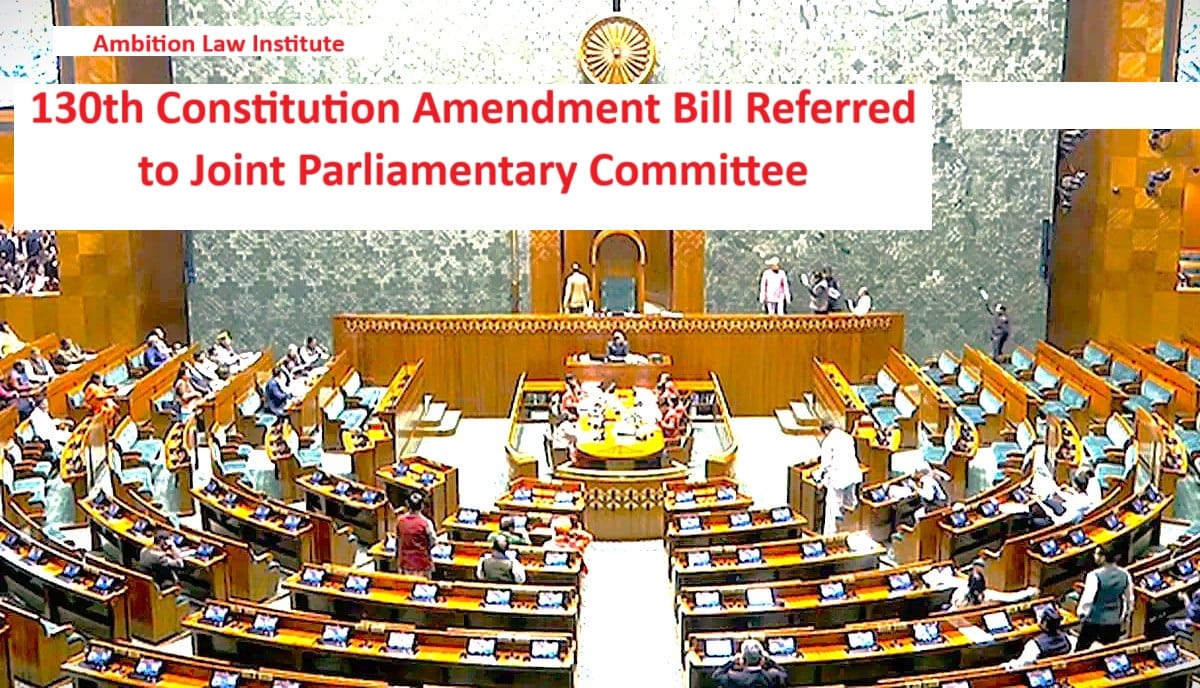Live law updates
130th Constitution Amendment Bill Referred to Joint Parliamentary Committee


130th Constitution Amendment Bill Referred to Joint Parliamentary Committee
New Delhi, August 20:
A major constitutional proposal aimed at ensuring probity in public office has been placed under parliamentary scrutiny. The Lok Sabha on Tuesday referred the 130th Constitution (Amendment) Bill, 2025 to a Joint Parliamentary Committee (JPC). The Bill, along with two corresponding legislations amending Union Territory laws, was introduced by Union Home Minister Amit Shah despite stiff opposition from several political leaders.
Core Provision of the Bill
The 130th Constitution (Amendment) Bill introduces a significant accountability mechanism for Ministers at both Central and State levels. It provides that if a Minister, including the Prime Minister or Chief Minister, is arrested and detained for 30 consecutive days in relation to an offence punishable with five years or more of imprisonment, they shall be removed from office.
The proposed clause under Article 75 (Central Ministers) states that the President shall remove such Minister on the advice of the Prime Minister by the 31st day of custody. If such advice is not rendered, the Minister will automatically cease to hold office from the following day. Importantly, the provision does not bar a re-appointment after the Minister’s release.
Parallel amendments are proposed to Article 164 (State Ministers) and Article 239AA (National Capital Territory of Delhi). To cover Union Territories, amendments are also proposed in the Government of Union Territories Act, 1963 and the Jammu and Kashmir Reorganization Act, 2019.
Legislative Process and Opposition
The Bill’s introduction faced strong objections from opposition leaders such as Asaduddin Owaisi (AIMIM), Manish Tewari (INC), NK Premchandran (RSP), KC Venugopal (INC) and Dharmendra Yadav (SP). They argued against the constitutional validity and possible misuse of such provisions. However, following a vote, the Bill was cleared for introduction.
Subsequently, the motion to refer the Bills to a JPC was also approved. The Committee will consist of 21 members from Lok Sabha and 10 from Rajya Sabha, tasked with examining the proposals and presenting its recommendations.
Statement of Objects and Reasons
The Government has justified the Bill by underlining the principle of constitutional morality and the people’s trust in governance. It notes that Ministers must remain “beyond any ray of suspicion” and act solely in public interest. Allowing detained Ministers facing serious allegations to continue in office, the statement says, risks eroding good governance and undermines constitutional trust.
Context and Recent Precedents
The amendment comes in the wake of multiple high-profile cases where Ministers, including Chief Ministers, have faced arrests over corruption and money laundering charges.
- Arvind Kejriwal (Delhi Liquor Policy case),
- V Senthil Balaji (Tamil Nadu cash-for-jobs scam),
- Hemant Soren (Jharkhand land scam), and
- Partha Chatterjee (West Bengal recruitment scam)
are among those who continued in office despite incarceration. In Senthil Balaji’s case, the Madras High Court and Supreme Court raised concerns about his reinstatement while on bail, eventually leading to his resignation.
Legal Significance
For legal professionals and students, the Bill raises critical issues regarding the separation of powers, executive accountability, and presumption of innocence. While it aims to uphold constitutional morality, questions remain over whether automatic removal without conviction could conflict with the principle of innocent until proven guilty.
Next Steps
The JPC’s findings will shape the future of this proposal. If passed, the amendment would mark a major shift in constitutional law, introducing automatic disqualification of Ministers under custody, and could significantly alter the balance between political accountability and criminal justice protections.



